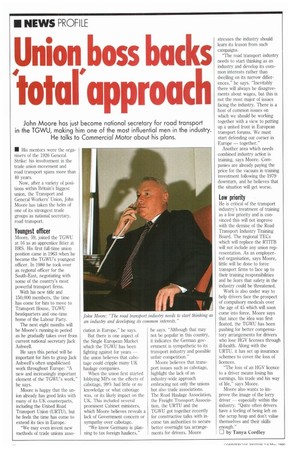Union boss backs
Page 30

If you've noticed an error in this article please click here to report it so we can fix it.
total approach
John Moore has just become national secretary for road in the TGWU, making him one of the most influential men in He talks to Commercial Motor about his plans. transport the industry.
• His mentors were the organisers of the 1926 General Strike: his involvement in the trade union movement and road transport spans more than 40 years.
Now, after a variety of positions within Britain's biggest union, the Transport and General Workers' Union, John Moore has taken the helm of one of its strongest trade groups as national secretary, road transport.
Youngest officer
Moore, 59, joined the TGWU at 16 as an apprentice fitter at HRS. His first full-time union position came in 1963 when he became the TGWU's youngest officer. In 1980 he took over as regional officer for the South-East, negotiating with some of the country's most powerful transport firms.
With his new title and 150,000 members, the time has come for him to move to Transport House, TGWU headquarters and one-time home of the Labour Party.
The next eight months will be Moore's running-in period as he gradually takes over from current national secretary Jack Ashwell.
He says this period will be important for him to grasp Jack Ashwell's often unpublicised work throughout Europe: "A new and increasingly important element of the TGWU's work," he says.
Moore is happy that the union already has good links with many of its UK counterparts, including the United Road Transport Union (URTU), but he feels the time has come to extend its ties in Europe.
"We may even invent new methods of trade unions asso ciation in Europe," he says.
But there is one aspect of the Single European Market which the TGWU has been fighting against for years — the union believes that cabotage could cripple many UK haulage companies.
When the union first started lobbying MPs on the effects of cabotage, 99% had little or no knowledge or what cabotage was, or its likely impact on the UK. This included several prominent Cabinet ministers, which Moore believes reveals a lack of Government concern or sympathy over cabotage.
"We know Germany is planning to tax foreign hauliers," he says. "Although that may not be popular in this country, it indicates the German government is sympathetic to its transport industry and possible unfair competition.'' Moore believes that transport issues such as cabotage, highlight the lack of an industry-wide approach embracing not only the unions but also trade associations. The Road Haulage Association, the Freight Transport Association, the URTU and the `IsGWU got together recently for constructive talks with income tax authorities to secure better overnight tax arrangements for drivers. Moore stresses the industry should learn its lesson from such campaigns.
"The road transport industry needs to start thinking as an industry and develop its common interests rather than dwelling on its narrow differences," he says. "Inevitably there will always be disagreements about wages, but this is not the most major of issues facing the industry. There is a host of common issues on which we should be working together with a view to putting up a united front in European transport forums. We must start defending our corner in Europe — together."
Another area which needs combined industry action is training, says Moore. Companies are already paying the price for the vacuum in training investment following the 1979 downturn, and he believes that the situation will get worse.
Low priority
He is critical of the transport industry's treatment of training as a low priority and is convinced this will not improve with the demise of the Road Transport Industry Training Board. The regional TEGs which will replace the RTITB will not include any union representation. As an employerled organisation, says Moore, little will be done to force transport firms to face up to their training responsibilities and he fears that safety in the industry could be threatened.
Work is also under way to help drivers face the prospect of compulsory medicals over the age of 45 which will soon come into force. Moore says that since the idea was first floated, the TGWU has been pushing for better compensatory arrangements for drivers who lose HGV licenses through ill-health. Along with the URTU, it has set up insurance schemes to cover the loss of licences.
"The loss of an HGV licence to a driver means losing his earnings, his trade and his way of life," says Moore.
Moore also wants to improve the image of the lorry driver — especially within the industry. "Quite often drivers have a feeling of being left on the scrap heap and don't value themselves and their skills enough."
111 by Tanya Cordley








































































































































































